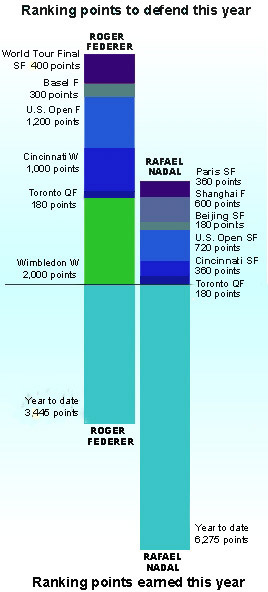Article on Ranking Points..Interesting facts here..
Federer's chase for the No. 1 record
When Roger Federer fell to Robin Soderling in the French Open, he didn't just lose a quarterfinal match -- he also lost his No. 1 ranking. By not reaching the semifinals, Federer gave Rafael Nadal the chance to overtake him by winning the tournament. And Nadal promptly did so, winning his fifth French Open crown to move back to No. 1 and nudge Federer down to No. 2.During the tournament, neither of them seemed to care much who ended up in the top spot.

Kamakshi TandonNo matter which way you look at it, Rafael Nadal has a definite edge over Roger Federer in the battle for No. 1.
"As far as the No. 1 ranking is concerned, it's in his hands now," Federer said after his loss, referring to Nadal. "Things change really quickly. I won't be following the rest of the tournament and hoping that Nadal doesn't win just so that I stay on top."
After winning the title, Nadal said, "When I was crying after the match, the last thing I was thinking was of the No. 1."But the switch was important in one respect -- it left Federer just shy of breaking the record for total weeks spent at No. 1, a pretty significant statistic in tennis. The Swiss does hold the record for the longest unbroken streak at No. 1, having spent 237 straight weeks at the top. But cumulatively, his count is 285 total weeks, one week behind Pete Sampras' mark of 286 total weeks.
At first glance, the setback doesn't seem particularly devastating -- Federer trails Nadal by only 220 points in this week's rankings, and Federer traditionally outperforms the Spaniard on grass and U.S. hard courts. So he should get a chance to move back up fairly soon, right?
In fact, Federer's chances of reclaiming No. 1 are slim until at least after the U.S. Open in September, and perhaps beyond.
Ranking points expire after one year, so players have to constantly match last season's performance at any given tournament to maintain their total. If they do better, their total goes up; if they do worse, it goes down.
Since Federer won the French Open last year and earned the maximum 2,000 points available, for example, he had no way of gaining ground this year -- the best-case scenario for the Swiss was to defend his title and collect another 2,000 points to replace the 2,000 that would drop off at the end of the tournament. As it happens, he reached only the quarterfinals, collecting 360 points (a net loss of 1,640 points). Nadal, who reached only the fourth round last year but won the whole thing this time around, had 180 points drop off and added 2,000 (a net gain of 1,820 points).
The same scenario is set to play out for the rest of the summer. Federer will be defending titles, finals and semifinals all the way, while Nadal has the opportunity to add a lot of points -- injuries forced him to miss Wimbledon last year and he had only so-so results during the North American hard-court season. All in all, Federer is looking to defend 3,120 points more than Nadal through the U.S. Open -- more than the equivalent of a Grand Slam plus a Masters title.
So the real gap between the two is far larger than the 310 points on this week's ranking list. Federer cannot retake No. 1 at Wimbledon under any circumstances, and should Nadal reach the semifinals there, Federer would have to win Toronto, Cincinnati and the U.S. Open to have any chance at all.
There's a possibility Federer could even drop to No. 3, with Novak Djokovic able to overtake him at Wimbledon if he both outlasts the Swiss and reaches at least the semifinals.
If Federer can avoid that scenario and stay within striking distance of No. 1, he will have chances to move back up in the fall, when he is defending fewer points than Nadal. At the same time, however, Nadal is also likely to play more tournaments, taking part in October's Asian swing while Federer may opt to skip Shanghai and take a break before the indoor events in Europe.
Either way, the bottom line is that Federer will have to do something special to earn back the No. 1 ranking. After he won the Australian Open, he was in position to simply coast to the 286-week record by reaching a semifinal here and there.
As it turns out, winning just two more matches at Indian Wells and Miami would have done it (he squandered match points in both his losses there), or defeating Nadal in the final of Madrid, or defeating Soderling in the French Open quarterfinals.
But week after week, he fell just short. And at the last minute, it slipped away.
So for the moment, it's a case of close-but-not-quite for Federer and the No. 1 record. He needs just a week or two more at the top, but getting back there could take a lot longer than that.
Kamakshi Tandon is a freelance tennis writer for ESPN.com. Robert Waltz contributed to this story.






0 comments